
SLAVONIC AND EAST EUROPEAN REVIEW
metrics 2024
Advancing Scholarship in Slavic Studies
Introduction
SLAVONIC AND EAST EUROPEAN REVIEW, published by the Modern Humanities Research Association, stands as a pivotal academic journal since its inception in 1971, focusing on the rich cultural, historical, and linguistic landscapes of Eastern Europe and the Slavic-speaking world. With its ISSN 0037-6795 and E-ISSN 2222-4327, this esteemed journal provides a platform for scholars to share innovative research and critical analyses that shape the understanding of these complex regions. Although not open access, it maintains a reputation for rigorous scholarship, reflected in its categorization across multiple fields including Cultural Studies, History, and Literature in prestigious quartiles. The journal's Scopus rankings further illustrate its importance in the academic community, fostering a dialogue among researchers, professionals, and students who seek to deepen their insights into Eastern European studies. As a contributor or reader, you will find the SLAVONIC AND EAST EUROPEAN REVIEW an essential resource in navigating the intricate narratives that define this significant area of scholarship.
Metrics 2024
 0.11
0.11 0.20
0.20 0.30
0.30 18
18Metrics History
Rank 2024
Scopus
JCI (Web Of Science)
Quartile History
Similar Journals
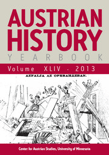
Austrian History Yearbook
Exploring the Depths of Austrian HeritageAustrian History Yearbook is a leading academic journal published by Cambridge University Press, focusing on the rich tapestry of Austrian history and its intersections with broader European narratives. With its ISSN 0067-2378 and E-ISSN 1558-5255, the journal has carved a niche within the academic landscape since its inception, offering insightful research and analysis that spans various periods and themes in Austrian history. Rated in the Q2 category for History in 2023, and boasting a respectable Scopus rank of #564 out of 1760 within the Arts and Humanities field, the Austrian History Yearbook stands out as a vital resource for historians, researchers, and students alike. The journal aims to promote scholarly discourse, foster critical engagement with historical texts, and contribute significantly to the historiography of Austria and its role in European history. With access options providing a gateway to an extensive repository of scholarly works, the journal serves as an essential platform for advances in historical research, making it indispensable for a global audience keen on understanding the complexities of Austrian heritage.
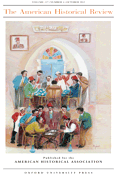
AMERICAN HISTORICAL REVIEW
Diving Deep into America's Rich Historical TapestryAMERICAN HISTORICAL REVIEW, published by Oxford University Press, stands as a premier journal in the field of history, representing a vital resource for researchers, academics, and students alike. With an impressive Q1 ranking in History and a robust track record in museology and archaeology, the journal is committed to advancing scholarly discussions and disseminating groundbreaking research that shapes our understanding of the past. While the journal is not open access, it remains highly respected, featured prominently in leading academic databases and boasting a significant impact on the humanities and social sciences. Its extensive coverage of historical periods—from 1970 through the present—ensures a comprehensive exploration of diverse historical narratives. The AMERICAN HISTORICAL REVIEW continues to foster intellectual engagement and diversity in historical discourse, making it essential reading for anyone keen on historical research and knowledge.
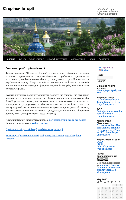
Storinky Istoriyi-History Pages
Advancing Historical Discourse in the Modern Era.Storinky Istoriyi-History Pages, published by the NATL TECHNICAL UNIV UKRAINE IHOR SIKORSKY KYIV POLYTECHNIC INST, is a prestigious academic journal dedicated to the exploration and analysis of historical narratives and their significance in contemporary contexts. With an ISSN of 2307-5244 and E-ISSN 2411-0647, the journal has embraced an Open Access model since 2012, facilitating wider dissemination of knowledge and encouraging scholarly dialogue among researchers, professionals, and students interested in history and its multifaceted impacts. Based in Kyiv, Ukraine, this journal serves as an essential platform for the publication of innovative research, critical reviews, and insightful articles that contribute to the ongoing academic discourse in historical studies. Although specific metrics such as H-index and Scopus rankings are currently unavailable, the journal is poised to enhance the visibility and impact of historical research on an international level, making it a valuable resource for those dedicated to understanding and interpreting the past.

OSTEUROPA
Connecting Voices in Eastern European StudiesOSTEUROPA is a distinguished academic journal dedicated to the examination and analysis of social, cultural, and political developments in Eastern Europe. Published by BWV-BERLINER WISSENSCHAFTS-VERLAG GMBH, this journal has been a critical voice in the field since its inception in the mid-20th century, notably converging from various years to establish a comprehensive discourse on the dynamics shaping the region. With an ISSN of 0030-6428 and an E-ISSN of 2509-3444, OSTEUROPA taps into the expansive fields of sociology and political science, holding a reputable Q3 category ranking in these disciplines for 2023. While not currently an open access publication, it remains a vital platform for researchers, professionals, and students alike who seek to deepen their understanding of Eastern European affairs. The journal also ranks in the 17th percentile within the Scopus listings, underscoring its role as a significant, albeit niche, contributor to social studies and political science scholarship. Addressed from its base in vibrant Berlin, OSTEUROPA continues to foster intellectual dialogue and provide valuable insights into the complexities of Eastern European societies.

Vestnik Sankt-Peterburgskogo Universiteta-Istoriya
Connecting Scholars: A Hub for Historical AnalysisVestnik Sankt-Peterburgskogo Universiteta-Istoriya is a distinguished academic journal published by the St Petersburg University Press, specializing in the field of History. As an influential platform since its inception in 2017, the journal has rapidly gained recognition, achieving a commendable Q2 ranking in History for 2023 and ranking #631 out of 1760 in Scopus's category of Arts and Humanities. With an emphasis on fostering scholarly discourse and disseminating high-quality research, it presents a curated selection of original research articles, critical reviews, and historical analyses, appealing to historians, researchers, and students alike. Operating from Russia, Vestnik Sankt-Peterburgskogo Universiteta-Istoriya serves not only as an incubator for innovative ideas but also as a bridge for international collaboration in the historiographical community. Although it currently does not offer open access, the journal's commitment to academic rigor and relevance ensures its continued impact in the field, with converged years extending to 2024, providing a rich archive for future scholars to engage with.

Eastern Journal of European Studies
Illuminating the past and present of Europe through rigorous study.Eastern Journal of European Studies is a distinguished open-access platform published by UNIV ALEXANDRU IOAN CUZA, CENTRUL STUDII EUROPENE, dedicated to advancing research and scholarship in the fields of Economics, History, Political Science, and Sociology. Since its inception in 2010, this journal has been committed to fostering a rich dialogue among scholars and practitioners, emphasizing interdisciplinary approaches to European studies. With a notable Q1 ranking in History and Q3 rankings in other social sciences categories as of 2023, the journal holds a strong position in both European and global research landscapes. As part of the Scopus indexing, it stands out with impressive percentiles, including the 90th percentile in History. By providing an open-access platform, the journal ensures that critical research is widely accessible, bridging gaps between academia and the public. It serves as an essential resource for researchers, policymakers, and students interested in exploring Europe’s complex dynamics, making significant contributions to contemporary debates and policy implications.
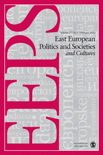
EAST EUROPEAN POLITICS AND SOCIETIES
Fostering scholarly exchange on the evolution of Eastern Europe.EAST EUROPEAN POLITICS AND SOCIETIES, published by SAGE Publications Inc, stands as a vital academic resource within the fields of sociology and political science, focusing primarily on the dynamics and transformations of Eastern Europe. With an ISSN of 0888-3254 and an E-ISSN of 1533-8371, this quarterly journal has been contributing to scholarly discourse since 1986 and continues to be a crucial platform for the exchange of innovative research and critical insights, boasting a commendable Q2 ranking in its category as of 2023. Researchers, professionals, and students engaged in the exploration of post-socialist transitions, identity politics, and socio-economic challenges will find this journal an essential tool for understanding the complexities of the region. While the journal offers limited open access options, its presence in academic databases ensures that cutting-edge research remains accessible to a broader audience. With a Scopus rank of #606 out of 1466 in the social sciences category, EAST EUROPEAN POLITICS AND SOCIETIES continues to shape the intellectual landscape and discourse surrounding Eastern Europe.

STUDIES IN EAST EUROPEAN THOUGHT
Fostering Scholarly Discourse on Eastern European IdeologiesSTUDIES IN EAST EUROPEAN THOUGHT is a premier academic journal published by Springer, focusing on the multifaceted intellectual heritage and cultural dynamics of Eastern Europe. Established in 1993, this journal has been a significant platform for scholarly discourse, promoting interdisciplinary research across the fields of Cultural Studies, Law, Literature, Philosophy, and Social Sciences. With an impressive impact reflected in its Scopus rankings, including a Q1 categorization in Literature and Literary Theory and a Q2 standing in Cultural Studies and Law, it remains at the forefront of academic research, contributing to the global understanding of Eastern European perspectives. The journal is available in both print (ISSN: 0925-9392) and electronic (E-ISSN: 1573-0948) formats, with a committed audience of researchers, professionals, and students eager to explore the intricacies of Eastern European thought. By engaging with diverse methodologies and contemporary issues, STUDIES IN EAST EUROPEAN THOUGHT continues to shape the academic landscape and elevate scholarly discussions surrounding this vibrant region.

East Central Europe
Fostering Insights into a Diverse RegionEast Central Europe is a prestigious scholarly journal published by BRILL that focuses on the intricate historical and cultural landscapes of the East Central European region. Established in 1975, this journal has become a pivotal platform for scholars, professionals, and students engaged in the fields of Cultural Studies, History, and Sociology and Political Science. With its comprehensive scope that spans significant historical periods and contemporary issues, East Central Europe aims to foster a deeper understanding of the socio-political dynamics and cultural developments that define this diverse area. Although not open access, the journal maintains a respectable impact within its category, ranking Q3 in both Cultural Studies and History, highlighting its relevance and reach within the academic community. Researchers interested in deepening their insights into regional studies will find this journal an invaluable resource, reflecting its solid position within the academic hierarchy, as evidenced by its ranking in Scopus. Further information and submission details can be accessed through BRILL's official website.
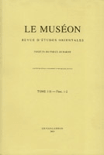
Museon
Unveiling New Perspectives in Humanities ResearchMuseon, published by PEETERS in Belgium, is a prominent academic journal dedicated to exploring the interconnected realms of History, Linguistics, Literature, and Religious Studies. With an ISSN of 0771-6494 and an E-ISSN of 1783-158X, this journal has been a reliable source of scholarly discourse since its inception in 1972, with coverage extending from 1976 to 2023. While the journal does not offer open access, it maintains a respectable reputation, as evidenced by its category quartile rankings in 2023, positioning it in Q2 for Literature and Literary Theory and Q3 for the other disciplines. Researchers and students in these fields will find Museon to be an essential platform for disseminating and engaging with innovative and critical analyses. The journal's commitment to high-quality scholarship is reflected in its diverse scope and its ongoing contribution to the humanities, making it a vital resource for advancing knowledge and fostering academic dialogue.